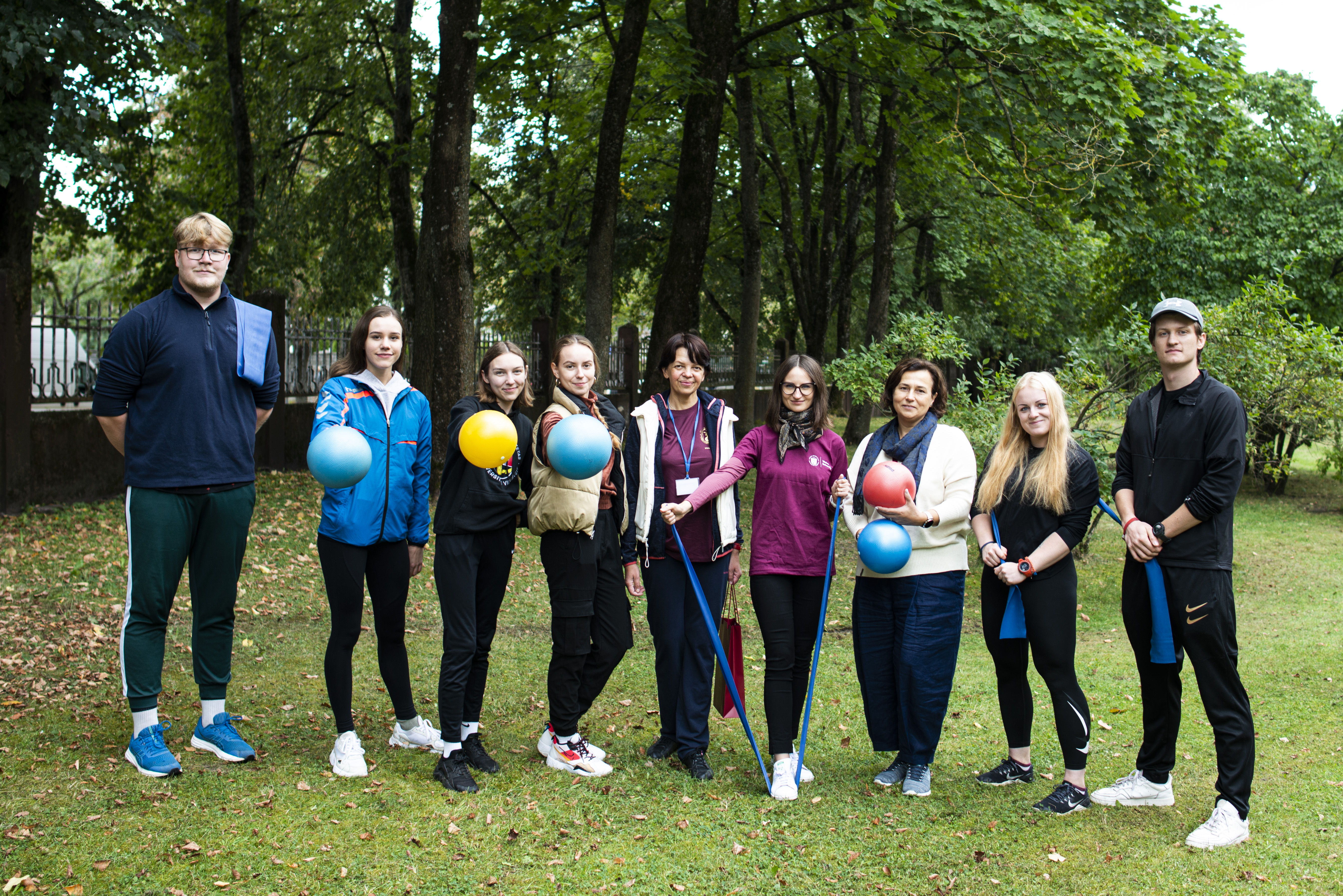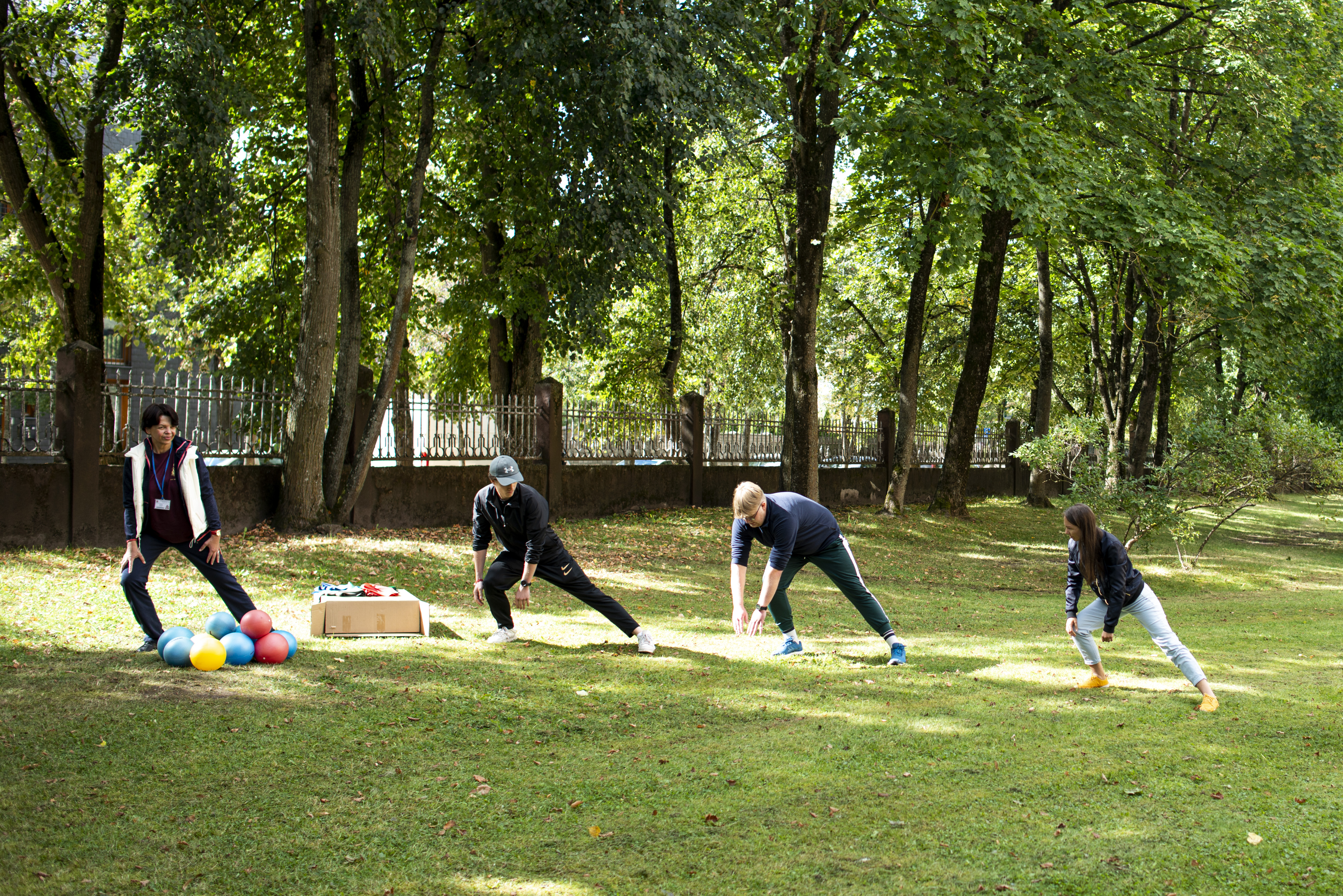 © FM archive
© FM archive
What is physical therapy? How does it benefit people? What does a physiotherapist really do? Why do young people choose to study physiotherapy and what is the daily life like of a student who has chosen to study it? Dr Ieva Eglė Jamontaitė, Assistant Professor at the Department of Rehabilitation, Physical and Sports Medicine of the Institute of Health Sciences (the Faculty of Medicine at Vilnius University), agreed to tell us all about it, and Deimantė Grincevičiūtė, a 3rd year student of the physiotherapy study programme at the Faculty of Medicine, agreed to share her impressions of her studies.
Different patient groups—different challenges for physiotherapists
“Movement is a natural human action. We move every day without even thinking about it. Everything seems to happen naturally. We start thinking about it when we feel pain that makes it difficult for us to move. We realise then, the immense power of movement. As a movement specialist, a physiotherapist seeks to ensure that the patient’s movement is correct, high quality and natural for their physiology. A short definition of physiotherapy is the treatment by movement,” said Dr Jamontaitė, who chose physiotherapy out of her love for dance; adding, “I’m very happy I’ve chosen this path. Physiotherapy is the field in which you can learn and improve throughout your life.”
According to Dr Jamontaitė, the scope of a physiotherapist’s work is very broad: “You can begin working with a patient in the intensive care unit, while they are still helpless, maybe even unconscious—that’s when we start performing passive movements. Later, as the patient slowly recovers, breathing becomes very important: it seems so natural, but sometimes you have to learn it all over again. So we start with very simple actions, gradually moving on to more complex ones. The treatment programme may be adjusted either by making it more difficult or easier, or perhaps changing it completely, depending on the patient’s condition and the aim, for example, the restoration of an impaired function.
Dr Jamontaitė singled out children as a category of patients who require a lot of imagination and the use of playful elements: “Children are a specific group, quite a challenge for a physiotherapist. It is one thing to work with babies who have motor disorders, or developmental problems, and another, to work with children who have suffered injuries. We must be really creative, skilful and patient to achieve the result. There are times, for example, when we have to crawl along with the child to assess the disorder and achieve a positive result in therapy.” According to Dr Jamontaitė, one of the most important things in physiotherapy is the analysis of the patient’s movements: the more detailed the examination is, the better it shows which muscles, joints, cardiovascular or other functions are impaired and the more precise the physiotherapy programme can be.
 © FM archive
© FM archive
Patient responsibility is also required
When asked about the most common disorders or conditions that cause people to contact a physiotherapist, Dr Jamontaitė replied: “Most of the time, I come across patients complaining of back, lumbar and neck pain. People shouldn’t wait until the pain is unbearable, but sometimes life gets in the way. We often don’t prioritise ourselves, we think, I’ll see the doctor, I’ll get treatment and that’s it. But that is not the case. Prevention is extremely important, and the most common cause of pain comes from the lack of prevention. When you ask a patient how long they have been in pain, they say five, maybe ten years... This shows that people often neglect it and only see a specialist when things get very serious. But at this point it is no longer possible to get a positive outcome particularly quickly. That’s why we warn our patients: physiotherapy is a long, consistent process, that will require a lot of patience and internal motivation.”
Dr Jamontaitė also mentioned the importance of involving patients in the treatment process. “The patient needs to be involved, to feel responsible for the treatment, to see the benefits and meaning. It is very important (and we emphasise this to our physiotherapy students), to do homework, to ask how the patient did with their exercises, to assess the patient’s progress on a daily basis whether it is a single procedure or part of a longer rehabilitation programme.“
When asked what motivates young people to choose physiotherapy studies, Dr Jamontaitė noted, “Physiotherapy students often are those who have experienced the positive effects of physiotherapy themselves. Perhaps they are young athletes who have personally experienced the importance of the physiotherapist’s role in regaining movement, returning to sport or achieving greater performance in sport. Others may have suffered injuries in childhood and seen a physiotherapist as a result. Others are motivated by physical activity and its promotion. There is probably no clear-cut answer to this question.”
“I’m where I belong”—a physiotherapy student at the Faculty of Medicine speaks about her studies
We also interviewed Deimantė Grincevičiūtė, a 3rd year student of the physiotherapy study programme at the Faculty of Medicine of Vilnius University, about her choice to study in the programme. “In the primary school I attended various sports clubs and tried a number of sports, and that’s how my love for physical activity and movement developed. Later, when I enrolled in the gymnasium, I abandoned sports as I had to study a lot. But later, in 10th grade, I set myself a goal that within a year I would find the study programme that I liked. I knew that I liked biology, especially anything to do with health topics. After examining the school subjects I liked and was interested in, it became clear that I would study physiotherapy. At that time, it seemed to combine sports and medicine. That’s how I got into physiotherapy. Today, I can safely say that I am where I belong.” Deimantė noted that the professionalism of the lecturers, their enthusiasm and their love for the science of physiotherapy motivate her the most in her studies. “They know how to keep you interested—how to infect you with the curiosity to learn new things on your own. So, in my free time, I not only study, but also participate in various conferences, training, workshops, and volunteer activities. This is how I accumulate experience and expand my knowledge,” explained Deimantė as she shared her impressions of her dream studies. When asked if her plans for the future will also be linked to physiotherapy, she did not hesitate to answer: “Of course! I can’t imagine my future without physiotherapy! At the moment, I am particularly interested in clinical and sports physiotherapy, which is probably where I will specialise when I graduate. Before that, I hope to go on an ERASMUS internship to gain new knowledge and skills and to observe how my colleagues abroad work in this field.”
